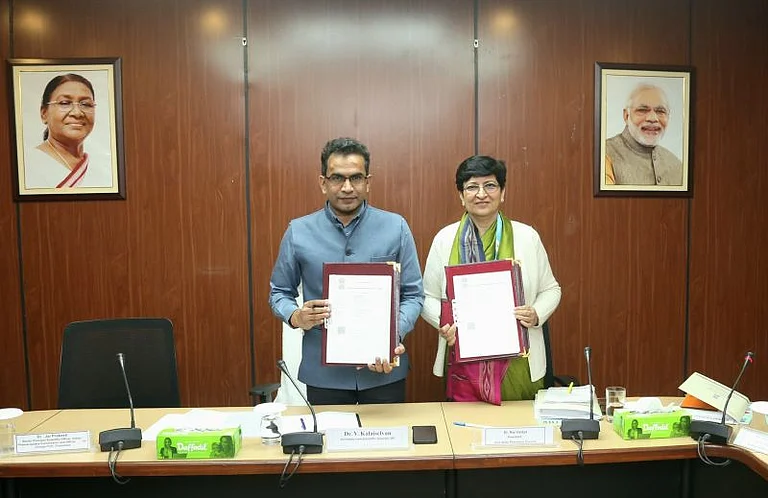Veteran tea taster/exporter Sanjay Kapoor is bullish. He feels the £271 million (Rs1,870 crore) takeover of Tetley by Tata Tea is a landmark move that will, at long last,drill some sense into the Indian tea market and help build domestic brands for globalconsumption. To drive home his point, Kapoor narrates an incident which he claims bestdescribes the mess the industry is in. A retired planters daughter visited his storeand asked for some classy Darjeeling. On being given a packet, she expressed her surpriseand admitted having bought the best Darjeeling tea in London. "That says it all. Weare the worlds largest tea producer but dont have a single brand in the globalmarket. With this deal, at least we have one brand the world considers global."
Kapoor should know. India, with a 150-year-old plantation history, produces 900 millionkg of tea. But the country doesnt have even one global brand which can sport thetrue-swadeshi label. Why?
Both exporters and senior officials of the Calcutta-based Tea Board point at thenations burgeoning domestic consumption as the main reason for the industrysinability to look at global markets. But with the Tetley takeover, the scene, hopefully,will change. Tetley, which earlier sourced tea from Kenya and Malawi, will look to Indianplantations. "Now sub-branding will become easier. We could have a Nilgiri or aDarjeeling being sold globally under the Tata-Tetley brand," says Kapoor.
Observers say that the deal caps a series of efforts New Delhi initiated to streamlinethe Rs 5,600-crore tea industry. Late last year, the government issued a notificationwhich trademarked Darjeeling (against continued global duplication;). New Delhi made itmandatory for global marketing companies to pay an annual brand fee of $450 and mentionthat Darjeeling was an Indian brand while reselling the tea. Besides, the commerceministry made several representations to exporters, exhorting them to tap new marketswhich the government felt has eluded Indians since the collapse of the Soviet Union whichpicked up nearly 80 per cent of Indias export on near-barter terms.
Admits Dolly Roy, Calcutta-based exporter and taster: "The deal is importantbecause it will help an Indian company take on global giants like Unilever. Besides,its a lesson for all Indian companies in developing global brands. Until recently,almost anyone and everyone was selling Darjeeling and we did nothing about it. Now thatits taken care of, exporters must develop Indian brands and find new markets."Agrees Indian Tea Association chairman R.S. Jhawar: "Its imperative for theindustry to achieve higher growth in the years to come. And the current deal will helpboost the countrys exports no doubt."
What does it mean for the Tatas? Analysts say taking over Tetley - which invented teabags in 53 and brought herbal and flavoured teas (black currant, apple and lemon) tothe world market - means a veritable bonanza for an Indian company, especially on twocounts. First, an Indian company has finally acquired a brand in the global market whichit should have dominated anyway thanks to the sheer size of its produce. It also meansgaining instant control of one-third of the UK market (teabags/22 per cent) and nearly 70per cent of Canadas. Besides, Tetley is second to PG Tips of Unilever in the US andAustralia and has a majority share of the smaller European markets. Led by Tata, Tetleynow plans a more aggressive campaign in France, Poland and Russia where tea has a hugemarket.
So, never mind if the deal didnt quite match the takeover of such Britishflagships as Rolls Royce. In London, Tetley became another something that was, untilrecently, very British but no longer. "The entry of Tata is very positive as far asthe marketplace is concerned. This has injected new vigour into the market in a verywell-established brand. New ownership always brings urgency into a company, and that isgood for the market as a whole," UK Tea Council director I. Lewis told Outlook.
Analysts claim the Tatas clinched it through negotiations guided by Arthur Andersen.Though last summer speculation pegged the sale price at £400 million, the considerationdipped to £320 million before falling to the present price. Which, analysts say, isrealistic. They claim Tatas credentials in tea won over Schroders and Prudential -each with about 30 per cent share - ahead of US rival Sara Lee Corp., known for itsEgberts coffee and Wonderbra. Shareholders voted for sale to a company with old successesin tea rather than more recent ones in undergarments. The Tatas gave shareholdersassurance through arrangements with some British banks, with hsbc reported to be amongthem. The tepid reaction of UKs institutional investors to a planned Tetley floatlast summer also helped.
But who wants to relinquish control, especially if tea is still considered a highlyBritish drink? The old Tetley management is presenting the takeover as a case of Indianmoney under English control. "Tata management will support the business throughnon-executive contribution on an independent Tetley board," it says following theTata takeover. But the management will be overhauled. After that will ensue a straightclash with Uniliver (with strong brands like Lipton and PG Tips). "These two big boyshave been running neck and neck," says Lewis. Now the Indian springboard could vaultTetley into the lead.
Britain imports 1,44,000 tonnes of tea annually. That means Tetleys annual UKsales are between 30,000 and 40,000 tonnes. Tetley will now set its sights on the top slotin the UK - and eye the growing US market. Tata hopes to build new markets combining theTetley brand with produce from its 26,000 hectares of plantations in India and Sri Lanka.It adds up to what Tetley calls a new agenda for aggressive growth following the buyout.Tata, which has had a joint venture with Tetley for the past five years, controlsone-third of Indias domestic market. "And as we enter into new regions, oursales and market share will increase substantially," says Tata Tea vice-chairman R.K.Krishna Kumar.
Surely. For a country coping for long with increasing domestic consumption and theconsequent marginal global presence, the Tata Tea deal is definitely a windfall. As longas rival tea companies dont pick up the scent and act likewise, that is.


























